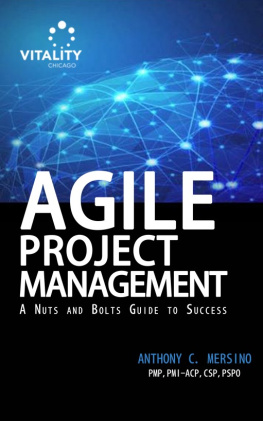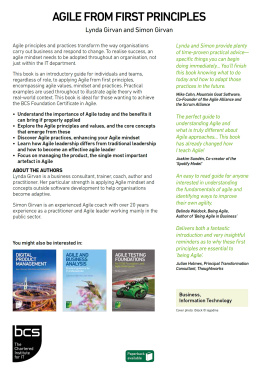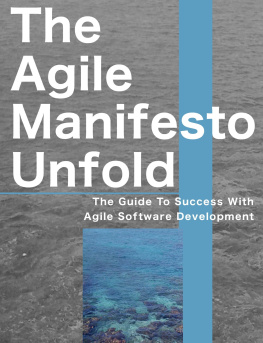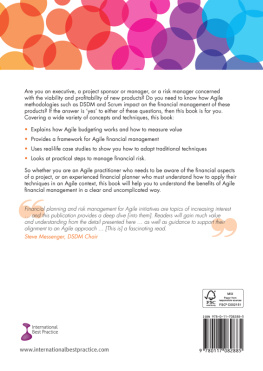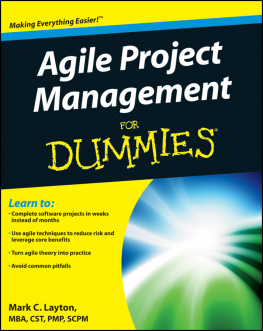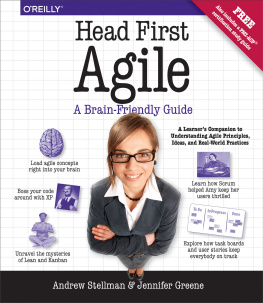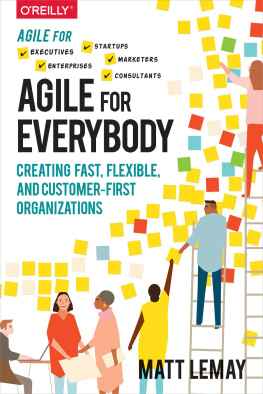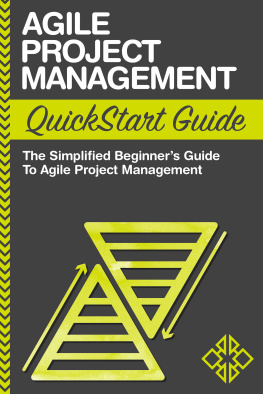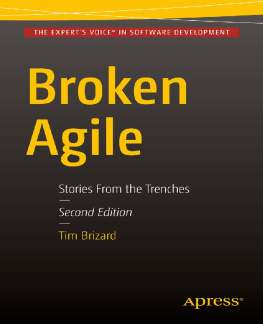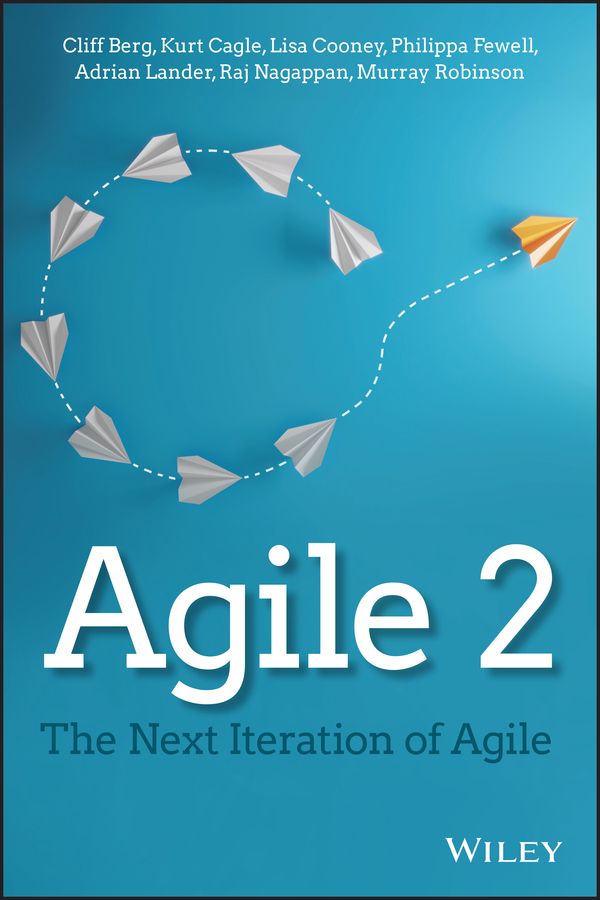
Table of Contents
List of Tables
- Chapter 4
List of Illustrations
- Chapter 1
- Chapter 9
- Chapter 12
- Chapter 13
Guide
Pages
Agile 2
The Next Iteration of Agile
Cliff Berg
Kurt Cagle
Lisa Cooney
Philippa Fewell
Adrian Lander
Raj Nagappan
Murray Robinson

Copyright 2021 Cliff Berg, Kurt Cagle, Lisa Cooney, Philippa Fewell, Adrian Lander, Raj Nagappan, and Murray Robinson
Published by John Wiley & Sons, Inc., Indianapolis, Indiana
Published simultaneously in Canada
ISBN: 978-1-119-79927-6
ISBN: 978-1-119-79952-8 (ebk)
ISBN: 978-1-119-79929-0 (ebk)
No part of this publication may be reproduced, stored in a retrieval system or transmitted in any form or by any means, electronic, mechanical, photocopying, recording, scanning or otherwise, except as permitted under Sections 107 or 108 of the 1976 United States Copyright Act, without either the prior written permission of the Publisher, or authorization through payment of the appropriate per-copy fee to the Copyright Clearance Center, 222 Rosewood Drive, Danvers, MA 01923, (978) 750-8400, fax (978) 646-8600. Requests to the Publisher for permission should be addressed to the Permissions Department, John Wiley & Sons, Inc., 111 River Street, Hoboken, NJ 07030, (201) 748-6011, fax (201) 748-6008, or online at www.wiley.com/go/permissions.
Limit of Liability/Disclaimer of Warranty: The publisher and the author make no representations or warranties with respect to the accuracy or completeness of the contents of this work and specifically disclaim all warranties, including without limitation warranties of fitness for a particular purpose. No warranty may be created or extended by sales or promotional materials. The advice and strategies contained herein may not be suitable for every situation. This work is sold with the understanding that the publisher is not engaged in rendering legal, accounting, or other professional services. If professional assistance is required, the services of a competent professional person should be sought. Neither the publisher nor the author shall be liable for damages arising herefrom. The fact that an organization or Web site is referred to in this work as a citation and/or a potential source of further information does not mean that the author or the publisher endorses the information the organization or website may provide or recommendations it may make. Further, readers should be aware that Internet websites listed in this work may have changed or disappeared between when this work was written and when it is read.
For general information on our other products and services please contact our Customer Care Department within the United States at (877) 762-2974, outside the United States at (317) 572-3993 or fax (317) 572-4002.
Wiley publishes in a variety of print and electronic formats and by print-on-demand. Some material included with standard print versions of this book may not be included in e-books or in print-on-demand. If this book refers to media such as a CD or DVD that is not included in the version you purchased, you may download this material at booksupport.wiley.com. For more information about Wiley products, visit www.wiley.com.
Library of Congress Control Number: 2021930182
Trademarks: Wiley and the Wiley logo are trademarks or registered trademarks of John Wiley & Sons, Inc. and/or its affiliates, in the United States and other countries, and may not be used without written permission. All other trademarks are the property of their respective owners. John Wiley & Sons, Inc. is not associated with any product or vendor mentioned in this book.
This book is dedicated to the members of the global Agile 2 team, who shared their expertise and experience and collaborated remotely throughout the COVID-19 pandemic to create Agile 2.
Cliff
I dedicate this to those who have felt frustrated that Agile, for all its hype and promise, didn't seem to bring to you much in the way of advantage and frequently seemed an exercise in pointlessness. There is goodness in Agile methods, but Agile is a hammer, and sometimes you need a violin.
Kurt
This book is dedicated to Agilists everywhere, those struggling in the trenches to apply its values and principles, regardless of their role or field of work, and who inspired us to try to make it better.
Lisa
This is dedicated to fellow Agilists seeking better balance, understanding, and improvement over what's been in practice for the last 20 years.
Philippa
My contribution here is dedicated to independent thinking and independent thinkers, who prefer to choose discovering what is really out there over acquired bias or simply following marketed experts without healthy challenge and validation and who have the courage to stand up even against popular opinion if that makes sense and do not shun putting in considerable effort to develop their (independent thinking) capabilities. In a first year of a series of global pandemic challenges, my heart is with those affected and who are fighting without complaining, never giving up, and finding ways to still help others.
Adrian
This book is dedicated to on-the-ground workers everywhere who have worked with and struggled with Agile in the past, and who inspired us to try to make it better. And to my late beagle Bindi, whose boundless love and loyalty taught me the true meaning of servant leadership.
Raj
This book is dedicated to people who have become disenchanted with the dogma, commercialization, and fake Agile that has taken over the Agile community. We want to reclaim Agile and revive the community's ability to learn and adjust and tackle problems that the original manifesto authors did not imagine. We hope you will join us.
Murray
About the Authors
C liff Berg is a consultant and founder of Agile Griffin, which specializes in merging Agile and DevOps. Cliff began his career doing systems analysis for electronic systems design and then building compilers, was on the team that created the VHDL language, and wrote the first synthesis compiler for that language. In 1995 he cofounded and served as CTO of Digital Focus, a startup that grew to 200 people by 2000 and adopted Agile (eXtreme Programming) in full force that year. Digital Focus was sold in 2006, and since then Cliff has helped more than ten organizations adopt Agile and DevOps methods, working with leadership and teams to implement change. Cliff has experience with Agile and DevOps in a wide range of contexts, from large multiproduct digital platforms to embedded systems.
Kurt Cagle is the community editor of Data Science Central (Tech Target) and the editor in chief of the Cagle Report. He is the author of 22 books on internet technology, data modeling, and knowledge representation, and he has served as an invited expert to the W3C for more than 10 years. As a consultant, Kurt's clients have included Fortune 50 companies, and US and European government agencies. When not trying to keep a handle on what's happening in the data world, he writes novels. He can be found on LinkedIn.
Lisa Cooney currently serves as the Agile coach at Axios. She is the editor of Evolvagility: Growing an Agile Leadership Culture from the Inside Out, by Michael Hamman (2019). Her eclectic background includes a master's degree in education, years of being a stay-at-home mom, and substitute teaching in K-12 schools while raising children, creating art, and writing. A lifelong learner, Lisa went from Basic and Pascal college classes to creating computer-based-training at Kodak to creating her own website in HTML to virtual online learning design. She spent years designing, writing, and managing (with Agile!) the program and project management curriculum (which included systems thinking) at the Department of Homeland Security. In 2014, she designed and wrote two virtual instructor-led courses called Agile for the Federal Government and Agile for the Product Owner for the Department of Veterans Affairs.
Next page

